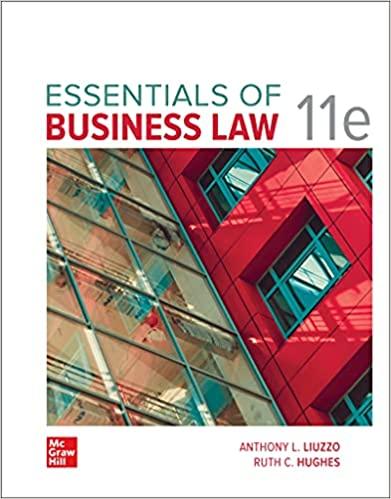Question
Hello! I'm just trying to prepare for a quiz and this is one of the questions on it, any help is greatly appreciated! Thank you!
Hello! I'm just trying to prepare for a quiz and this is one of the questions on it, any help is greatly appreciated! Thank you!
When the first question refers to chapter 4, this is what chapter 4 contains: The Constitutional Powers of Government : 4-1a A Federal Form of Government, 4-1b Relations among the States, 4-1cThe Separation of Powers, 4-1d The Commerce Clause, 4-1e The Supremacy Clause and Federal Preemption, 4-1f The Taxing and Spending Powers, 4-2 Business and the Bill of Rights, 4-2a Limits on Federal and State Governmental Actions, 4-2b Freedom of Speech, 4-2c Freedom of Religion, 4-2d Searches and Seizures, 4-2e Self-Incrimination, 4-3, Due Process and Equal Protection, 4-3a Due Process, 4-3b Equal Protection, 4-4Privacy Rights, 4-4a Federal Privacy Legislation, 4-4b The USA Patriot Act and the USA Freedom Act.
Facts:
For many years, New York City has had to deal with vandalism and defacement of public property caused by unauthorized graffiti. In an effort to stop the damage, the city banned the sale of aerosol spray-paint cans and broad-tipped indelible markers to persons under age twenty-one years of age. The new rule also prohibited people from possessing these items on property other than their own. Within a year, five people under age twenty-one were cited for violations of these regulations and 871 individuals were arrested for actually making graffiti.
Lindsey Vincenty and other artists wished to create graffiti on legal surfaces, such as canvas, wood and clothing. Unable to buy supplies in the city or to carry them into the city from elsewhere, Vincenty and others filed a lawsuit on behalf of themselves and other young artists against Michael Bloomberg, the city's mayor and others. The plaintiffs claimed that, among other things, the new rules violated their right to free speech.
Questions:
- How can the plaintiffs argue that the city's new rules violate their freedom of speech? Explain using legal principles from chapter four.
- How can the city's mayor and others argue that the new rules do not result in a free speech violation? Explain using legal principles from chapter four.
- Will the city's ban be subject to strict scrutiny, intermediate scrutiny or the rational basis test? Explain.
- Based on your answer to question three, does the city's ban result in an equal protection violation because it only applies to persons under age twenty-one? Why or why not? Explain and apply the proper standard of review.
Step by Step Solution
There are 3 Steps involved in it
Step: 1

Get Instant Access to Expert-Tailored Solutions
See step-by-step solutions with expert insights and AI powered tools for academic success
Step: 2

Step: 3

Ace Your Homework with AI
Get the answers you need in no time with our AI-driven, step-by-step assistance
Get Started


